On Foreign Policy, Jeb Bush Would Be Another George W. Bush
Like nearly all of his fellow Republicans, Jeb Bush has adopted the disastrous foreign policy views that typified his brother's Presidency.
Jeb Bush has spent the last several months of his exploration of a potential bid for the White House putting forward an image of himself of his own man separate from the Presidencies of his father and his brother, but when it comes to foreign policy, there doesn’t seem to be much difference between Jeb and his older brother:
If Jeb Bush is elected president, the United States won’t be on speaking terms with Cuba and will partner more closely with Israel. He’ll tighten sanctions on Iran and urge NATO to deploy more troops in Eastern Europe to counter Vladimir Putin. And he’ll order the U.S. military to root out “barbarians” and “evildoers” around the globe.
Far from running from or playing down the views once expressed by his brother George W. Bush, Jeb Bush is embracing them — and emphasizing them.
It is clear when he calls for closer engagement with Arab leaders to combat the growing threat of the Islamic State. Or when he criticizes President Obama for pulling U.S. troops out of Iraq. It is most apparent when he refers to “evildoers” — a formulation used widely by his brother — and argues that the United States needs to engage but doesn’t have to be “the world’s policeman,” a view voiced by his brother that was also embraced by their father, George H.W. Bush.
“We now have a president — the first one, I believe, in the post-World War II era — that believes that America’s power is not appropriate and America’s presence is not a force for good,” Jeb Bush told a crowd of business leaders in Columbus, Ohio, this week. “He’s wrong. With all due respect, he is just plain wrong.
Bush also openly embraces what is clearly the most controversial aspect of his brother’s foreign policy:
When it comes to Iraq, Bush is mostly supportive of his brother’s legacy there.
“There were mistakes in Iraq for sure,” he said during a speech in Chicago in February. “Using the intelligence capability that everybody embraced about weapons of mass destruction, it turns out to not be accurate.”
But in that appearance, he also called the 2007 Iraq troop “surge” “one of the most heroic acts of courage politically that any president’s done.”
“It was hugely successful and created a stability that when the new president came in, he could build on to create a fragile but more stable situation,” he said.
Bush has said repeatedly that Obama’s decision to withdraw forces from the region further destabilized Iraq and neighboring Syria and led to the rise of the Islamic State terrorist group.
The situation in Syria has “been made worse by actually not having a . . .small contingency force in Iraq, where we’ve had similar to Korea and other places where having a small contingency force would have allowed some degree of stability to take place,” he said in Columbus, adding, “Now those voids are being filled by this Islamic terrorist threat. . . . So our pulling back, it precipitated part of this problem.”
Left unstated by Governor Bush, of course, is the fact that, in withdrawing American troops from Iraq at the end of 2011, President Obama was simply following through on a plan that had been adopted by President Bush, as well as abiding by the terms of the Status Of Forces Agreement that had been negotiated between the Bush Administration and the Iraqi Government. His comments, though, are largely identical to what passes for the standard Republican talking points when it comes to Iraq and the rise of ISIS, that the Iraq War was an unqualified success and that everything that has gone wrong in that country over the past four years is solely due to the action or inaction of the Obama Administration. Ignored in that analysis, of course, is the fact that what is now ISIS used to be called Al Qaeda In Iraq, a group that came into existence in the aftermath of the collapse of the regime of Saddam Hussein and as a direct response to the American occupation. As I’ve said before, while Obama has certainly not handled foreign policy very well on his own, largely because he has followed policies that are largely indistinguishable from those of his predecessor, Republican orthodoxy on this issue, which white washes the disastrous foreign policy legacy of George W. Bush will continue to be an albatross around the party’s neck going forward unless they are willing to move beyond what was obviously a mistake. By his own remarks, Governor Bush certainly doesn’t seem to be willing to do so.
At least initially, there seemed to be some indicating that Jeb Bush’s foreign policy views would be more in line with those of his father rather than those of his brother. Even before he formed his exploratory committee, he named two of the elder Bush’s closest advisers, James A. Baker III and George Schultz, to his foreign policy advisory team. In short order, though, that team also came to be populated by Bush 43 era figured such as Paul Wolfowitz and Porter Goss, among others. Additionally, as he’s talked more about foreign policy issues over the past several months, it’s become clear that the younger Bush has not exactly inherited his father’s foreign policy restraint and has instead, as Daniel Larison notes, adopted the same aggressive interventionist views on foreign policy typified by his brother’s Presidency, and which now dominate the mainstream inside the Republican Party:
The article goes on to say that Jeb Bush isn’t repudiating his brother’s views. On the contrary, he is “embracing them — and emphasizing them.” Of course he is. There was never any reason to expect him to do anything else. Granted, it is politically foolish for any Republican candidate to endorse Bush-era foreign policy, but that doesn’t stop almost all of them from doing it. Being identified with George W. Bush remains a political liability whether any of these candidates wants to admit it. Being identified with one of the most costly and disastrous parts of the last administration’s record is even worse.
As an objective matter, of course, Larison is right. As I stated, though, and as I think he recognizes, continuing to support the disastrous policies of the Bush Administration isn’t a political liability inside the Republican Party. Instead, it’s essentially a political requirement to the point where those Republicans who have criticized Bush’s foreign policy record have generally been ostracized. Even Rand Paul, who is really the only candidate in the 2016 race that has foreign policy views that stray from Republican orthodoxy in interesting and important ways, doesn’t go so far as to openly criticize the Bush Administration, nor does he stray very far from the party line that everything that has happened in Iraq and Syria in recent years is due to nothing other than errors or omissions by the Obama Administration. What that says about the Republican Party I’ll leave for readers to judge for themselves, but nobody should be all that surprised that Jeb Bush is embracing his brother’s foreign policy because all of his fellow Republicans are doing the same thing.
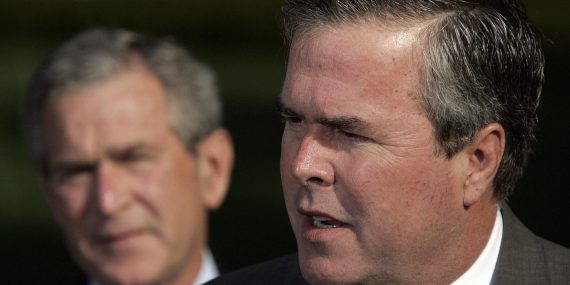

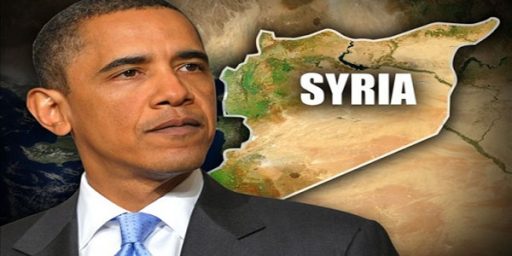

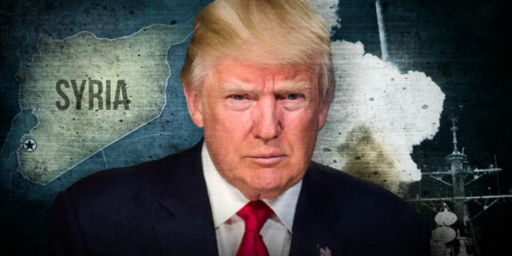
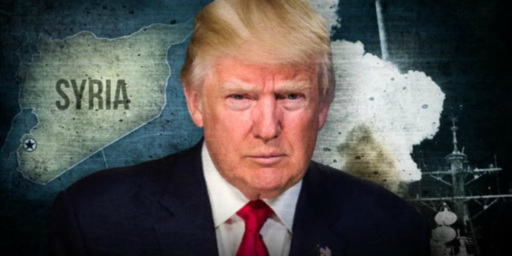
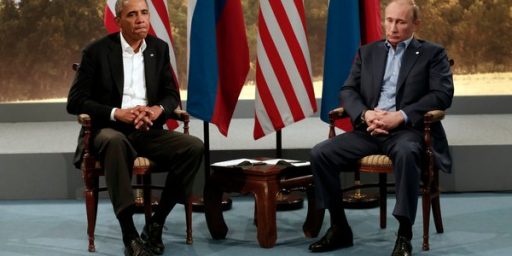
It seems Jeb has the same relationship with facts that his brother, and the rest of the Republican party, has. How do you engage with the world, when you are unable to see the world for what it is? These are not policy disagreements; these are delusions.
http://thedailyshow.cc.com/videos/vdy8qg/the-jon-stewart-mysteries-presents–the-case-of-the-iranian-agent-
Yes, this, just like those 2 countries he invaded wasting trillions of dollars and causing the deaths of hundreds of thousands of people….
Really Doug, even when I agree with you to a large extent (there are many aspects of Obama’s foreign policy that go way too far in lock step with the post WWII orthodoxy)(call it a Cold War hangover) you go and say something totally loopy.
The Afghan Surge of 2009, Libya, the Drone War, the current “war” against ISIS. It’s all the same logic as the Bush Administration, just implemented slightly differently.
JEB:
I love the continued delusion about the success of the surge on the part of so many in the GOP. They always seem to forget that there were 2 goals the surge was supposed to achieve: 1) A lessening of violence that would 2) allow for political reconciliation among the various parties vying for power there. That the first part was successful (largely thru payments to stop killing each other) is true but did not lead to the 2nd goal with out which the first part would be nothing but a respite. Iraq is still a broken country.
Republican foreign policy is still dominated by The Project for a New American Century crowd which advocates for US hegemony throughout the world. Unfortunately I suspect that Hillary Clinton is in this camp as well.
@Doug Mataconis:
I don’t think that word…Logic…means what you think it means.
But nice to see you are still fully enjoying your “both-sides-do-it” fetish.
@Doug Mataconis: I agree with you Doug, it is the same logic, Cold War ad infinitum, but there is a BIG difference in the expenditure of Treasury and human capitol. I don’t know how we break the FP orthodoxy that has such a strong grip on both parties. The only thing that really changes from one side to the other is the rhetoric and the degree of action.
Had a conversation with a couple of conservative friends the other day and ISIS came up. I said, “Call me when they get a boat.” They didn’t get it. In their minds, ISIS is the greatest threat to this country since Al Qaeda. Never mind that AQ was never a threat to this country and neither is ISIS. To Americans? Yes, with out a doubt. To the country? Not for another millenium or 2.
@Doug Mataconis: BHO will always get major foreign policy points in my book for getting us out of Iraq. I’d rather he’d done it on Day 1 in 2009, but better late than never, and we would still be there if a President McCain or Romney had their way.
The rest of his record is hardly pretty for the reasons you mentioned, but I still can’t call him and Bush equivalents.
Wouldn’t it be great if an American politician of any stripe announced that waging war is a bad idea proven by the unsatisfactory results we got in three big wars (Korea, Vietnam, and Iraq) and frequent poor outcomes of smaller engagements such as the Reagan cut/run in Lebanon and Clinton’s Black Hawk Down in Somalia? My fellow Americans, I say to you if elected I will undertake diplomacy in world affairs, and yes I am the type of leader who is willing the long patient route since war has often backfired.
@OzarkHillbilly:
Beg to differ…It’s not the same logic.
In the case of Bush you have bluster and blunder amplifying willful ignorance.
In the case of Obama you have someone dealing with a clusterf’ck left at his doorstep.
@Doug Mataconis:
No. No. Ridiculous The logic of the Bush regime was cook up a fake threat based on lies, and then act on that threat for domestic political advantage, while simultaneously screwing up and ignoring an actual threat (the hunt for al Qaeda).
Obama, on the other hand, is reacting as events unfold in response to actually occurring threats and/or crises — or did he invent the Afghanistan War, Libya, al-Qaeda in Yemen and ISIS?
Seems Doug has given up on the mythical moderate, adult Republicans coming in and re-instituting the “realistic” Republican foreign policy of yore.
Maybe he’ll realize that those same moderate, adult Republicans don’t exist for Republican domestic and social policy either
@Slugger: In fairness to Clinton:
In December 1992, U.S. President George H. W. Bush ordered the U.S. military to join the U.N. in a joint operation known as Operation Restore Hope, with the primary mission of restoring order in Somalia. The country was wracked by civil war and a severe famine as it was ruled by a number of faction leaders. Over the next several months, the situation deteriorated.
It is fair to say that Clinton, like Obama in Afghanistan, continued this policy.
@C. Clavin: And reacting to it just like any other American politician, both Dem and Republican. I have a saying that Presidents should repeat to themselves every time there is a crises somewhere in the world that for some reason or another they feel the good old USofA just has to get involved in:
Don’t just do something, sit there.
@Rafer Janders:
Hey, Doug has to do his “both sides do it” pretzel logic, or else he might (gulp) actually have to consider voting for a Democrat, and his libertarian trained brain would short out if presented with that possibility, so there’s that.
Doug,a realistic foreign policy means you have to deal with actual threats, or do you think jihadist terrorism has disappeared from the face of the earth?
@Slugger:
Actually, it was George H.W. Bush, not Clinton, who ordered US forces into Somalia in 1992, though the Battle of Mogadishu did occur when Clinton was president.
@Doug Mataconis:
In the same way as a firefighter battling a fire started by an arsonist is following the same logic as the arsonist, just implemented slightly differently. They’re both dealing with fire, after all! Both sides do it!
I will not trust any Republican who surrounds himself with the same neocon lunkheads who created the wrecked foreign policy of the 21st century. Enough with these idiots. It’s not like there aren’t other conservative people out there who know a thing or two about foreign policy.
@OzarkHillbilly:
Au contraire…
Do you really think for a minute that Obama’s measured, and pretty darn successful, approach to ISIS is the same that Cheney and the Neo-Cons would be doing? Their own statements put the lie to this silliness.
Jeb:
Link:
The conservative concept of post-surge “stability” tends to be overstated.
@C. Clavin: To repeat myself: @OzarkHillbilly: The only thing that really changes from one side to the other is the rhetoric and the degree of action.
Presidents of both parties have this urge to get involved in things that we have no need to. For example, Libya. It has been a failure. Those who were against getting involved were right (I was ambivalent, I was wrong) Chances are it was going to be a failure no matter what, whether we got involved or not. I give Obama credit for his restraint in comparison to what the neocons would have done, but let’s not pretend that Libya has been some kind of great success.
ISIS is…. ISIS. To repeat myself again, “Call me when they get a boat.”
ISIS is nothing more than a glorified terrorist group and it’s capabilities are severely limited and in no way shape or form are they any kind of long term thereat to anyone. They sow the seeds of their own destruction every where they go. Between Iran, the Saudis, Iraq, Turkey, Jordan, Kuwait, Bahrain, Egypt…. If we do nothing at all ISIS will eventually disappear. Should we do something? I suppose, but to cite Obama’s muddling along*** in Syria as some kind of FP genius is reaching a little bit I think.
*** for the record, I think “muddle” is about the best anyone can do there, so rather than a criticism it is a simple acknowledgement of the realities with that situation.
@OzarkHillbilly:
Yes, that, why don’t we do more just paying people to do what we want? It would be cheaper than blowing the place up.
@OzarkHillbilly: Muddling is indeed the best choice right now. W. Bush would have fought ISIS, as he did everything else, focused on the effect on domestic politics. We’d be seeing a lot of bombast and preening, and not much management or pragmatism. Obama may be muddling, but he’s muddling fairly quietly. And so far ISIS is out of Tikrit, Kobani, and about a third of their peak territory. Jeb’s approach, one suspects, would indeed be more like W’s than Obama’s.
I think Doug makes a valid point in that George Bush would also have gotten involved in Libya, Syria and Yemen and would have overseen a significant increase in drone attacks. The differences are that under Mr. Bush, these would have been conducted with less competence and would be accompanied by some other unnecessary military adventures as well.
Of course Mr. Bush never had to deal with a Senate bypassing him to directly tank treaty negotiations by communicating with leaders of a long time enemy nation, or a House inviting a foreign leader to come address them in an attempt to undermine their own president. I cannot imagine trying to conduct foreign policy under these conditions.
We are the world’s only superpower. We have wide interests in keeping sea lanes open, in ease of communication and commerce, in stability particularly in areas where instability can bleed into Europe or the US. We have an interest in remaining the pre-eminent power.
We are the rich and the powerful. We want to protect what we have, and that means we need to manage the world at least to some extent. We want to avoid the rise of a competing superpower. We want to keep the hoi polloi sufficiently satisfied that they don’t rise up against us. All of which takes a careful balance of persuasion by example, persuasion by diplomacy, persuasion by sanction and economic pressure, and, when all else fails, force.
Republicans get the force part of it. Having invested psychologically in the Big Stick they tend to think Big Sticks are the answer to every problem and entirely ignore the knock-on effects, which they assume will also be managed by applying the stick. Their motto could be Carthago delenda est. They’ve never met a problem they don’t want to bomb or invade.
I think this simplistic approach is appealing in some ways, but it’s also evidence of impatience, and a refusal to confront ambiguity and detail and specifics. In short, it’s juvenile. And I say this as a guy who is often drawn to the bomb ’em all approach.
The Libya action was in line with this thinking. Mr. Obama avoided loss of American life and treasure, but no one can argue that the result supports our national interests.
I think this mentality is an echo of WW2. But times and tactics have changed, and a country reduced to rubble no longer holds together while beginning to rebuild. Instead it splinters into factions, tribes, sects, each with its own militia and/or terrorist wing. We kept Germany and Japan intact with long occupation, and with the threat of communism. That set of circumstances simply doesn’t exist anymore. Germany and Japan were countries that had some internal cohesion, some internal logic, but the countries we’re dealing with now have no such internal cohesion. Smash the ruling thug and you get a dozen mini-thugs.
We need to use our entire tool box, not just the stuff that blows up.
@gVOR08:
“Obama may be muddling, but he’s muddling fairly quietly.”
And effectively. Unlike Bush the Younger, he spends very little time beating his chest about how his policies have worked (with the partial exception of killing bin Laden). But his track record is far better, including keeping effective sanctions together against Iran to get them to the negotiating table (and which will likely do the same in the next few months against Russia), removing chemical weapons from Syria, etc.
” just implemented slightly differently.”
2 trillion dollars, 5000 American lives and 100,000 Iraqi lives differently. I guess “slightly” has a different meaning for lawyers.
Steve
@Pete S:
I wonder if the next Republican president will be afforded the same treatment by Senate Democrats, I sure hope not.
@stonetools:
That person does exist, but she’s the presumptive Democratic nominee.
Doug: “Left unstated by Governor Bush, of course, is the fact that, in withdrawing American troops from Iraq at the end of 2011, President Obama was simply following through on a plan that had been adopted by President Bush, as well as abiding by the terms of the Status Of Forces Agreement that had been negotiated between the Bush Administration and the Iraqi Government. ”
Note that Jeb is both saying ‘f*ck the word of the USA’, but also ‘keeping my brother’s word is evil’.